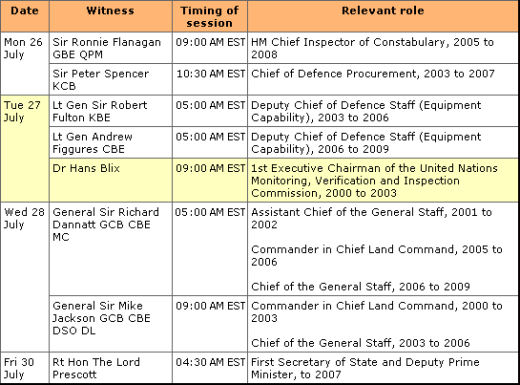
[Note: Times adjusted to US EST]
U.N. weapons inspector Hans Blix faults Bush administration for lack of "critical thinking" in Iraq
UCBerkley News
By Bonnie Azab Powell
18 March 2004BERKELEY: Speaking on the anniversary of the United States’ invasion of Iraq, originally declared as a pre-emptive strike against a madman ready to deploy weapons of mass destruction (WMDs), the man first charged with finding those weapons said that the U.S. government has "the same mind frame as the witch hunters of the past" — looking for evidence to support a foregone conclusion.
"There were about 700 inspections, and in no case did we find weapons of mass destruction," said Hans Blix, the Swedish diplomat called out of retirement to serve as the United Nations’ chief weapons inspector from 2000 to 2003; from 1981 to 1997 he headed the International Atomic Energy Agency. "We went to sites [in Iraq] given to us by intelligence, and only in three cases did we find something" – a stash of nuclear documents, some Vulcan boosters, and several empty warheads for chemical weapons. More inspections were required to determine whether these findings were the "tip of the iceberg" or simply fragments remaining from that deadly iceberg’s past destruction, Blix said he told the United Nations Security Council. However, his work in Iraq was cut short when the United States and the United Kingdom took disarmament into their own hands in March of last year.
Blix accused U.S. President George W. Bush and U.K. Prime Minister Tony Blair of acting not in bad faith, but with a severe lack of "critical thinking." The United States and Britain failed to examine the sources of their primary intelligence – Iraqi defectors with their own agendas for encouraging regime change – with a skeptical eye, he alleged. In the buildup to the war, Saddam Hussein and the Iraqis were cooperating with U.N. inspections, and in February 2003 had provided Blix’s team with the names of hundreds of scientists to interview, individuals Saddam claimed had been involved in the destruction of banned weapons. Had the inspections been allowed to continue, Blix said, there would likely be a very different situation in Iraq today. As it was, America’s pre-emptive, unilateral actions "have bred more terrorism there and elsewhere"…
A war of utter folly
Responsibility for this spectacular tragedy must lie with those who ignored the facts five years ago
The Guardian
By Hans Blix
20 March 2008The invasion of Iraq in 2003 was a tragedy – for Iraq, for the US, for the UN, for truth and human dignity. I can only see one gain: the end of Saddam Hussein, a murderous tyrant. Had the war not finished him he would, in all likelihood, have become another Gadafy or Castro; an oppressor of his own people but no longer a threat to the world. Iraq was on its knees after a decade of sanctions.
The elimination of weapons of mass destruction was the declared main aim of the war. It is improbable that the governments of the alliance could have sold the war to their parliaments on any other grounds. That they believed in the weapons’ existence in the autumn of 2002 is understandable. Why had the Iraqis stopped UN inspectors during the 90s if they had nothing to hide? Responsibility for the war must rest, though, on what those launching it knew by March 2003.
By then, Unmovic inspectors had carried out some 700 inspections at 500 sites without finding prohibited weapons. The contract that George Bush held up before Congress to show that Iraq was purchasing uranium oxide was proved to be a forgery. The allied powers were on thin ice, but they preferred to replace question marks with exclamation marks.
They could not succeed in eliminating WMDs because they did not exist. Nor could they succeed in the declared aim to eliminate al-Qaida operators, because they were not in Iraq. They came later, attracted by the occupants. A third declared aim was to bring democracy to Iraq, hopefully becoming an example for the region. Let us hope for the future; but five years of occupation has clearly brought more anarchy than democracy.
Increased safety for Israel might have been an undeclared US aim. If so, it is hard to see that anything was gained by a war which has strengthened Iran…

Sorry, the comment form is closed at this time.